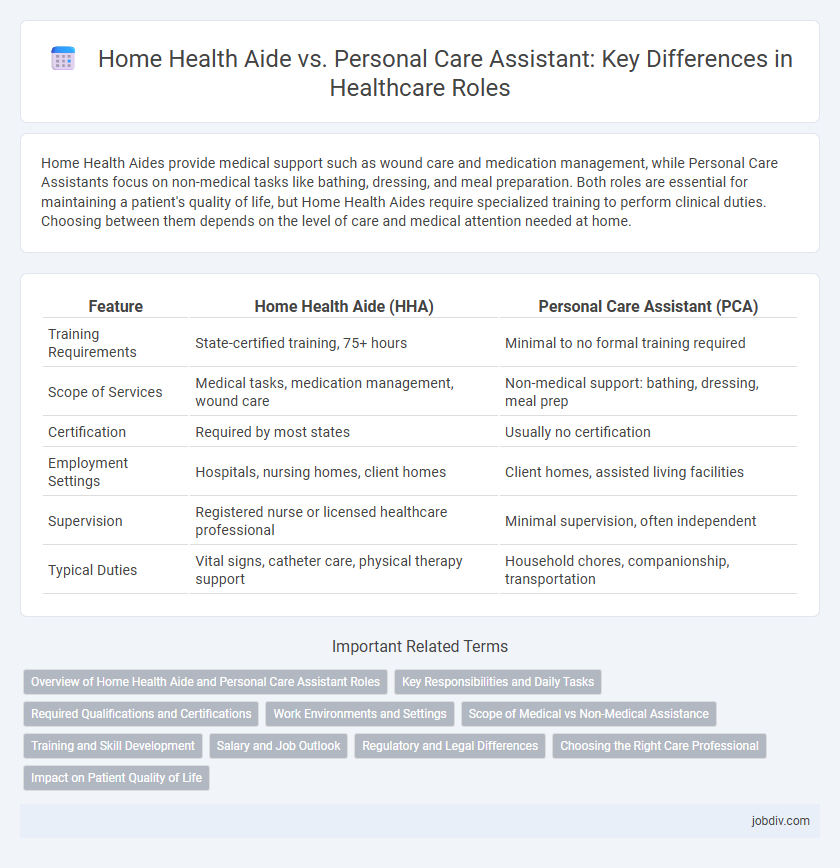Home Health Aides provide medical support such as wound care and medication management, while Personal Care Assistants focus on non-medical tasks like bathing, dressing, and meal preparation. Both roles are essential for maintaining a patient's quality of life, but Home Health Aides require specialized training to perform clinical duties. Choosing between them depends on the level of care and medical attention needed at home.
Table of Comparison
| Feature | Home Health Aide (HHA) | Personal Care Assistant (PCA) |
|---|---|---|
| Training Requirements | State-certified training, 75+ hours | Minimal to no formal training required |
| Scope of Services | Medical tasks, medication management, wound care | Non-medical support: bathing, dressing, meal prep |
| Certification | Required by most states | Usually no certification |
| Employment Settings | Hospitals, nursing homes, client homes | Client homes, assisted living facilities |
| Supervision | Registered nurse or licensed healthcare professional | Minimal supervision, often independent |
| Typical Duties | Vital signs, catheter care, physical therapy support | Household chores, companionship, transportation |
Overview of Home Health Aide and Personal Care Assistant Roles
Home Health Aides provide skilled medical support such as medication management, wound care, and vital signs monitoring, often under professional healthcare supervision. Personal Care Assistants primarily help with daily living activities including bathing, dressing, meal preparation, and light housekeeping to enhance the client's comfort and independence. Both roles are essential in home healthcare, but Home Health Aides have more clinical responsibilities while Personal Care Assistants focus on non-medical personal support.
Key Responsibilities and Daily Tasks
Home Health Aides provide medical-related support such as monitoring vital signs, administering medications, and assisting with wound care under professional supervision. Personal Care Assistants focus on non-medical tasks including helping with bathing, dressing, meal preparation, and light housekeeping to support daily living activities. Both roles require strong interpersonal skills and the ability to cater to individual client needs while promoting safety and comfort at home.
Required Qualifications and Certifications
Home Health Aides (HHAs) typically require certification through state-approved training programs, including courses on basic nursing skills, infection control, and emergency procedures, often followed by passing a competency exam. Personal Care Assistants (PCAs) usually have fewer formal requirements, with on-the-job training sufficing in many states, although some regions may require a certificate in caregiving or first aid. Both roles demand clear background checks and ongoing education to maintain compliance with healthcare regulations and ensure quality patient care.
Work Environments and Settings
Home Health Aides commonly work in private residences, providing medical-related care such as medication management and physical therapy assistance under the supervision of healthcare professionals. Personal Care Assistants typically operate in less clinical environments, including clients' homes and assisted living facilities, focusing on non-medical support like bathing, dressing, and meal preparation. Both roles require adaptability to varying settings, but Home Health Aides often engage with more regulated and health-focused work environments.
Scope of Medical vs Non-Medical Assistance
Home Health Aides provide medical-related services such as medication administration, wound care, and monitoring vital signs under a healthcare professional's supervision. Personal Care Assistants focus on non-medical support including assistance with activities of daily living (ADLs) like bathing, dressing, and meal preparation. Understanding the distinction in scope of care is essential for selecting appropriate in-home support services tailored to patient needs.
Training and Skill Development
Home Health Aides (HHAs) undergo formal training programs that include state-approved coursework and supervised clinical practice, equipping them with skills in basic nursing tasks, medication management, and vital signs monitoring. Personal Care Assistants (PCAs) typically receive less standardized training focused on assistance with activities of daily living, such as bathing, dressing, and meal preparation, often through on-the-job training or shorter certification courses. The comprehensive education and skill development for HHAs enable them to perform a broader range of healthcare-related duties compared to PCAs.
Salary and Job Outlook
Home Health Aides typically earn an average salary of $28,000 to $31,000 annually, while Personal Care Assistants often have a slightly lower average salary range of $25,000 to $29,000 per year. The job outlook for both professions remains strong, with the U.S. Bureau of Labor Statistics projecting a growth rate of about 33% for Home Health Aides and 39% for Personal Care Assistants through 2032, driven by an aging population and increased demand for in-home care services. Employment opportunities for Personal Care Assistants are expanding faster due to their broader role in supporting individuals with daily living activities beyond healthcare tasks.
Regulatory and Legal Differences
Home Health Aides (HHAs) are regulated by state and federal agencies, requiring formal training, certification, and adherence to healthcare standards under Medicare or Medicaid guidelines. Personal Care Assistants (PCAs) generally have fewer regulatory requirements, often only needing background checks and basic training, with oversight typically handled by private agencies rather than government programs. The legal scope of practice for HHAs includes clinical tasks under supervision, whereas PCAs provide non-medical support such as assistance with daily living activities without performing healthcare procedures.
Choosing the Right Care Professional
Selecting the right care professional depends on the specific needs of the individual, with Home Health Aides (HHAs) providing medical-related services such as medication management and wound care, while Personal Care Assistants (PCAs) focus on non-medical support like bathing, dressing, and meal preparation. Evaluating the level of medical care required alongside personal assistance needs ensures optimal support and enhances patient well-being at home. Understanding state regulations and certification requirements helps in making an informed decision between HHAs and PCAs.
Impact on Patient Quality of Life
Home Health Aides provide medical-related support such as medication management and basic health monitoring, directly enhancing patient safety and health outcomes. Personal Care Assistants focus on non-medical tasks like bathing, dressing, and meal preparation, which significantly improve daily comfort and independence. Both roles are essential in boosting patient quality of life by addressing physical needs and promoting emotional well-being.
Home Health Aide vs Personal Care Assistant Infographic

 jobdiv.com
jobdiv.com